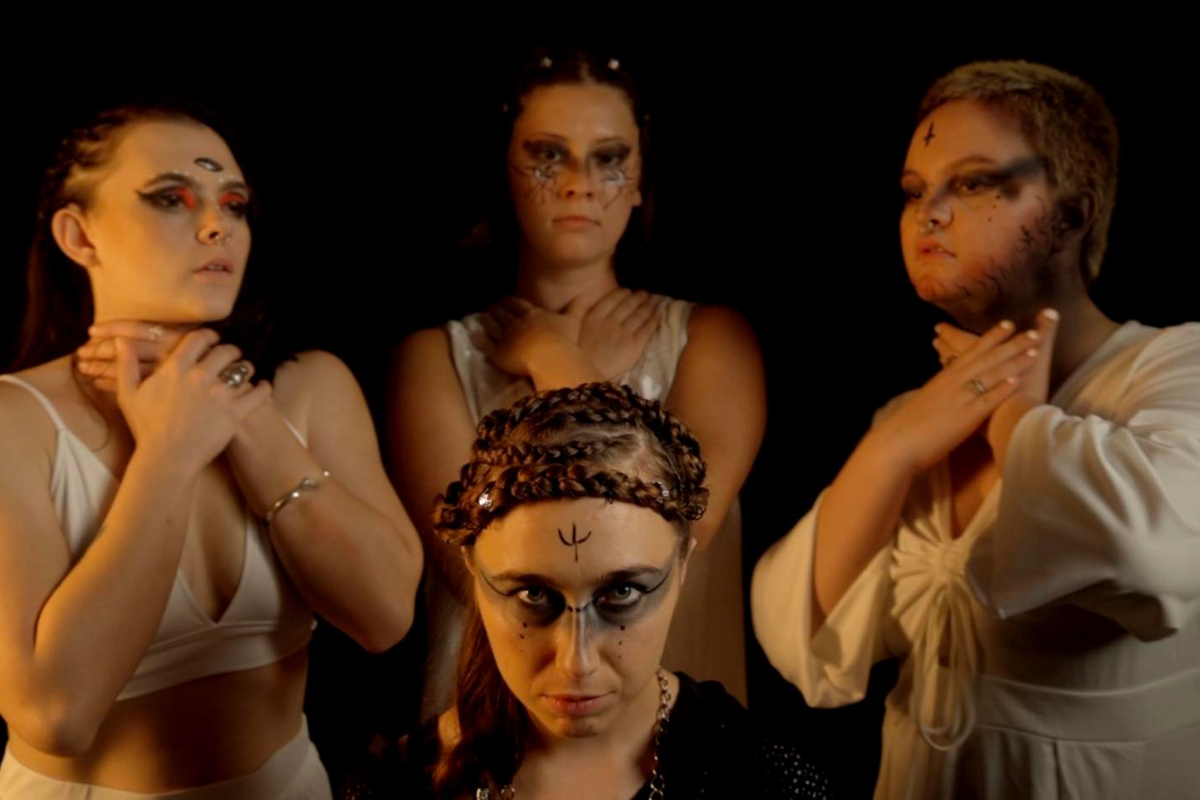Tulsa
Weird Sisters To The Fore In Gender-Experimental Macbeth
by | Nov 7, 2023 5:21 pm
Post a Comment | E-mail the Author
Posted to: Theater

PEMBROKE PLAYERS PHOTO
Weird Sisters, Wicked Macbeth.
Macbeth
Pembroke Players
The Broadway
720 S. Kenosha Ave., Tulsa
Closed
There’s nobody in Tulsa — and I’m including the likes of King Cabbage in that — who knows how to start a show better than Pembroke Players. When I walked into their first-ever production (Who’s Hamlet?) back in July, the first thing I saw was a life-size coffin in the middle of The Broadway’s rows of chairs, which boded well. (Or would that be “ill”?) As the house lights went down, a cast member jumped up onto the coffin and taught the crowd a rousing English folk song, complete with clapping and stomping and actual hooting and hollering — and before you cringe, let me assure you that singing this very strange song with a bunch of strangers was a blast. More than that, it dropped us right into the time and spirit of the play, almost as if we’d been dropped into the Globe Theater during the era of Shakespeare himself.
For Pembroke Players’ recent Macbeth, also at The Broadway (a tiny venue on the far eastern edge of downtown), a long sturdy table sat where the coffin of Who’s Hamlet? had been: this is a family drama, after all. This time as the show began it was the Weird Sisters — three witches who, far from being minor characters, stood at the center of this production — who gathered around to bring the audience into the deep, Dark Ages weirdness of the play. As they coiled and snaked over the table and into the crowd, dancing in wafting white dresses, immediately followed by Macbeth leading a jaw-dropping slow-motion swordfight to a dubstep version of a Viking tune, we got it right away: this would be not just a different Macbeth, but a different Shakespeare experience altogether than we might have seen before.
That’s what Pembroke Players aims to do as a new community theatre company in Tulsa: bring us fresh takes on classic works that we think we know — or maybe have never gotten to know at all, given their apparent remoteness from 21st-century life (or too many boring experiences of them in school). Brilliantly curated music and a creative use of space are fundamental to how Pembroke Players does this, but they’ve added another challenge to any “musty old relic” views of works like these. Who’s Hamlet? offered the audience the chance to cast the play’s four main parts themselves from a roster of male- and female-presenting actors of diverse ages, so that on any given night the dynamic onstage might be radically different from the conventional. For the six-night run of Macbeth, set in the 9th-century Scotland the play’s characters really lived in, the roles of Lord and Lady Macbeth were alternately performed by one male-presenting pair of actors (Sean Patrick Rooney and Cody McCoy, the cast I saw) and one female-presenting pair (Meagan Mulgrew and Sagely Long), and many other roles were gender-swapped as well.

PEMBROKE PLAYERS PHOTO
Cody McCoy as Lady Macbeth (L), Sean Patrick Rooney as Macbeth (R).
What difference does it make to see McCoy as a subtle, cunning, devastating Lady Macbeth (his real-life ancestor!), or Mulgrew as the paranoid, doom-spiraling Lord? In a play with masculinity at its center — the destructive force of “vaulting ambition” between husband and wife, between warlords, among clans — it was energizing and clarifying to hear female voices in traditionally male roles and vice versa. For instance, when Sally Allen (as Macduff mourning the death of his wife and children) responded to a challenge to take the loss “like a man” by crying out, “I shall do so. But I must also feel it as a man,” we felt the full weight of the historical burdens placed on both men and women when it comes to expressing grief. Theatre companies across the world have been experimenting with gender in Shakespeare plays for decades; Pembroke Players’ efforts help Tulsa audiences hear this language and meet these characters from new perspectives that strengthen our ability to connect to a great work of art.
Great, and genuinely difficult (and long — the seat cushions provided at the ticket counter were a very thoughtful offering). Directed by one of Tulsa’s great actors, Vivica Walkenbach, this Macbeth (with fantastic Viking-inspired makeup and hair by Knikki Nash, strong choreography by Jodianne Loyd, and historical costuming by McCoy) pulled us into the strangeness of the world Shakespeare drew upon, while prioritizing clear diction and a well-paced flow of speech and action. There were, naturally, varying levels of comfort among everyone in the room when it came to Shakespeare’s language; with the actors who were most sure with it, I stopped even noticing the iambic pentameter, which just pulsed in movement and weight under their voices, like a heartbeat that synced up with my own.
There’s so little Shakespeare being produced around here these days that any chance to get into it — for both actors and audiences — is worth taking. Even more so when the chance is imaginatively, ambitiously offered. Pembroke Players approaches these works with a seriousness that’s purposeful and playful rather than precious or pretentious. Next stop for them on the classics beat? Jane Austen. Their audience-integrated version of Pride and Prejudice premieres in Spring 2024.
Next for Alicia: Killing the Negative, Philbrook Museum of Art